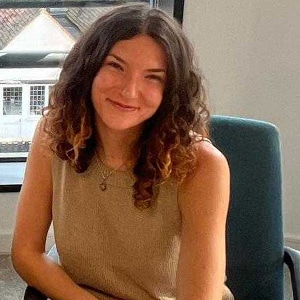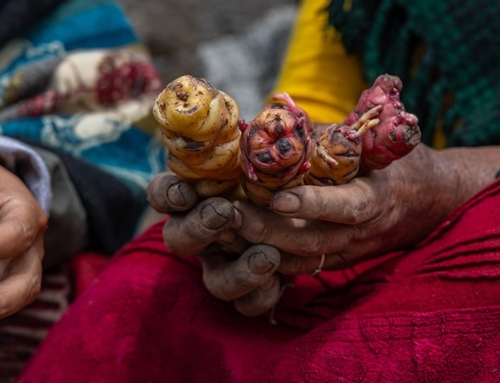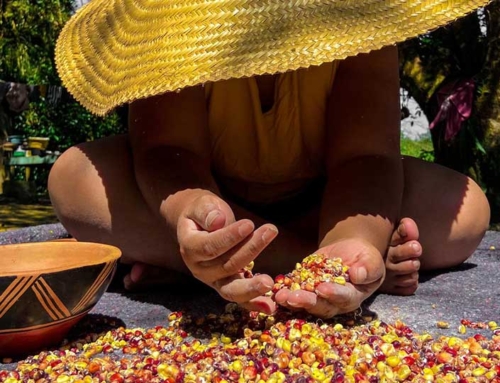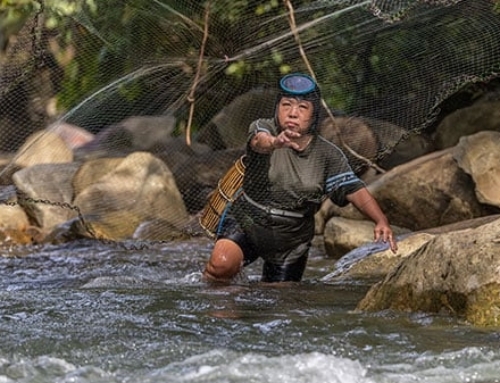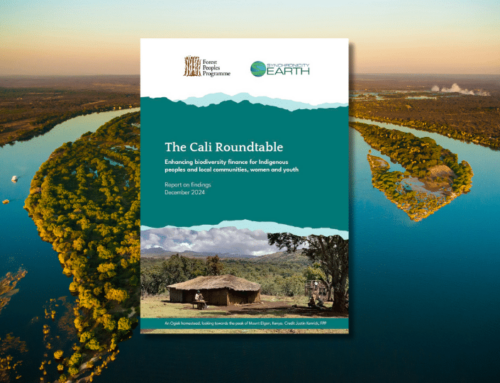If we want to create a liveable future for all beings, it’s vital we listen to Indigenous voices, which too often go unheard.
That’s why we hosted a Listening Session at The Sidebar alongside the Skoll World Forum, creating a space for influential individuals to pass the microphone to Indigenous representatives, and instead take an intentional listening role.
Distinguished guests Professor Dame E.J. Milner-Gulland and Elaine Martyn joined our event to hear from three Indigenous leaders: Christiane Pankararu (Pankararu People, Brazil), Iniquilipi Gracilio Chiari Lombardo (Kuna, Kunayala People, Panama), and Joan Carling (Kankanaey People of the Igorot group, Philippines).
Content warning: This piece mentions violence against Indigenous Peoples, including sexual assault. It has been edited for clarity and conciseness.
Joan Carling is a Filipino Indigenous activist who has been defending the rights of Indigenous Peoples for more than 30 years. The Philippines is one of the most dangerous countries in the world for Indigenous Peoples. While she was still in college in 1984, activist Macli-ing Dulag was murdered for campaigning against the Chico River Dam Project in order to safeguard the native Kalinga people. After attending his memorial, Joan became a human rights activist in Kalinga, speaking out against injustices done to Indigenous Peoples who fight for the rights of their people, their land, and the environment.
Joan has continued this work through her Executive Director role at Indigenous Peoples Rights International, alongside Pawanka Fund, Indigenous Peoples of Asia Solidarity Fund, Tenure Facility, and International Indigenous Women’s Forum.
Throughout our Listening Session, she reflected on the support Indigenous leaders truly need, and challenged the audience to move beyond passive listening – towards deeper understanding and active allyship.

L-R: Professor Dame E.J Milner-Gulland, Christiane Pankararu, Iniquilipi Gracilio Chiari Lombardo, Joan Carling, and Elaine Martyn at Indigenous Voices: A Listening Session for Global Change.
I want to start with my childhood.
Growing up as an Indigenous girl, running, playing in the forest, harvesting mushrooms. It is embedded in my heart.
Then, I saw the injustice done to our Indigenous brothers and sisters. And I don’t understand why.
Why is it so easy for them to build dams or mines as if we don’t exist? If this was done in non-Indigenous territories would they not consult them? Would they not compensate them?
Since witnessing this, I have a strong sense of injustice.
We bring diversity to the world. We have our own culture and identity and we’re proud of it – and for what we do to protect the environment. But why are we being attacked?
This is what I say to companies: Instead of knocking on your door and asking for permission to enter, imagine somebody just barged into your house, destroyed all your furniture and took whatever had value to them. That’s what’s happening in our territory. Would you allow that to happen to you?
Why is it so easy to disregard the territories of Indigenous peoples? It’s a clear violation of free, prior, and informed consent – simple as that. You cannot just take away our lands.
When it happens to individuals, the perpetrator is arrested and put in jail, right? And us, No, we’re evicted, and we have to fend for ourselves. And what happens to our women? They are raped.
This is the reality we’re dealing with. And it’s going to get worse with climate change – even by the climate change ‘solutions’ that are being imposed.
I am really alarmed by these developments. We are continuously undermined in spite of our role and contributions. I just feel that we are not being heard.

I’ve been on the frontline protesting mining, together with my colleagues in the Philippines, and three of them were killed. At the time, I couldn’t move around without a bodyguard. What’s happening is that as we get stronger, the more we are asked to sacrifice.
What gives me hope is that we have good allies and, as Indigenous Peoples, we’re building our resilience, raising our visibility, proving ourselves.
I am going to give an example of some steps we have taken. Government officials had not yet seen how devastating mining is. So, we showed them the reality. Brought them to the place where they have practically flattened the mountain. They spoke to people in the area about how it depleted their water, destroyed their livelihoods. And this helped turn around their thinking. It takes persistence, patience, courage and a little pressure, but we can make our officials accountable.
But we need you to be with us.

I see that a lot of donors prefer to fund big, white, male-dominated organisations. And I always think, what do they have that we don’t have? We’re the ones working on the ground, making those changes, and we don’t get the resources.
We have a small fund for frontline supporters. We’re swamped with requests for support. But we don’t have the resources. These people are sacrificing their lives, their families, to defend their land.
We need to unlearn how we give funding – results frameworks, reporting processes. It’s not really what we need. What about the needs of those on the ground fighting for justice, for peace? Sustainable development, clean water, good health. Ask what do they need and how can I support that? How can I be in solidarity with them? How can I be an asset?
Direct finance is important because it is an exercise in the autonomy of Indigenous Peoples. Please don’t come with funds for your own specific topic or project, we are the ones who know our territories and communities.
Of course, we’re not perfect. The important thing is if we go wrong, we take the lesson and learn from it. It’s the trust, and accompaniment, that the support we’re getting is deserved.
I think all of us need to reflect on where we are now and what we are going to do. It’s only through our collective action, and using the knowledge and values of Indigenous People that we can move forward. These are the values of reciprocity, solidarity, sharing, and caring – of being above our personal interest and upholding the common good.
With or without your money, we’re going to defend our land and resources. We are doing this not only for us, but for all of us.
For us, it’s a principle – that we have to take care of future generations, not only future generations but the future of humanity. We are in a global crisis together, we need to be in this together.
Shall we go together?

A huge thank you to our incredible speakers and distinguished guests, the Sidebar team, and all those who joined to listen.
Listening is just the first step: we hope you take these words with you to drive action, and honour the knowledge shared by learning from it.
For more listening sessions, watch our Flourishing Diversity playlist.
Our Biocultural Diversity Programme supports Indigenous and local communities to protect and revive their lands. If you are interested in supporting this work, please get in touch.

